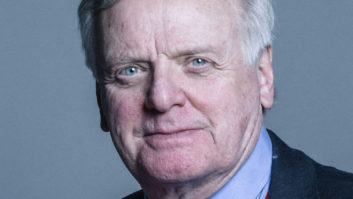Michael Grade will be a very different chair of Ofcom compared to the UK media regulator’s previous incumbents, media analyst Claire Enders tells TVBEurope.
Last night it was announced that he is the government’s preferred candidate for the role, and now faces MPs on the Digital, Culture, Media and Sport Select Committee for pre-appointment scrutiny at a date to be confirmed.
Lord Grade is currently a Conservative peer, and is well known for expressing his thoughts on the future of public service broadcasting in the UK. “I don’t know what his expectations are, but I imagine that someone will tell him that he will have to restrain his desire to make public pronouncements,” Enders adds.
“What he brings to the role is the political connection. He’s the opposite in every respect from Lord Burns and Dame Patricia Hodgson, who were his predecessors, because neither of them expressed their political views,” she continues.
“Also neither of them had a specific agenda that they’d been pursuing for some time to diminish and change institutions such as the BBC or Channel Four, which have been established by Parliament and only Parliament can change,” she adds.
Despite serving as chief executive of Channel 4 from 1988-1997, Grade has spent a number of years calling for the broadcaster to be privatised, including giving evidence to a House of Lords committee last October.
“I think he’s spent 13 years advocating for the privatisation of Channel Four on the grounds that it wasn’t sustainable,” says Enders. “And of course last year, he was part of a company mounting a bid for Channel Four. We’ve never had a chair of Ofcom with a specific political and a specific prior commercial agenda. It’s very unusual to have a completely political appointment to a regulator that has very specific legal responsibilities.”
Enders adds that typically the chair of Ofcom has been a public servant. “It’s a public body devoted to public service,” she explains. “It fulfils its role with a public service ethos and it primarily hires people who have that ethos. Lord Grade will find the culture completely different from anything he’s experienced before. When he worked at the BBC, the culture there is very, very different from that of Ofcom. On the other hand, it’s extremely competently run so he will be able to lean on the advice of the staff, and of course, his job is to chair the board, it’s not to be the chief executive.”
Nadine Dorries, UK secretary of state for digital, culture, media and sport, is currently mulling the future of Channel 4 following a public consultation last year. Enders says that while Grade won’t be able to make the decision himself about the broadcaster’s future, he will have the advantage of having the direct ear of the minister. “He will also have the advantage of being the first person that the minister calls when she’s been made apoplectic by the impartial tone of a BBC broadcast,” she adds. “That’s a really important part of the chair role.”







